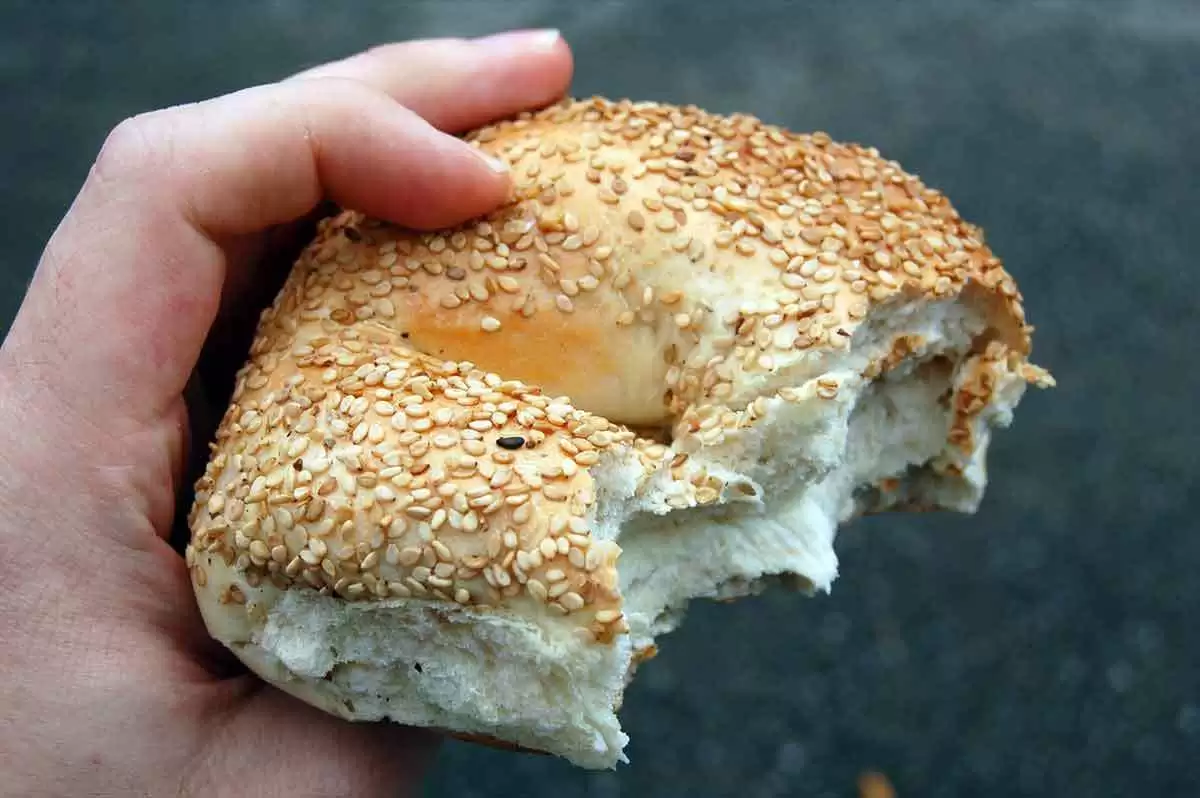
Celiac.com 07/19/2008 - When I was 6 years old, I lived in Dallas, Texas, and I had a best friend named Judy. It was at her house that I first ate a bagel. I fell in love with its chewy, crusty texture. I didn’t know much at that age, but I knew that I loved eating those bagels – I couldn’t get enough.
I also knew, from a very young age, that something was wrong with me. Something that they would one day discover and name after me. I had stomachaches all the time. I can’t remember a time when my stomach didn’t hurt at least a little bit.
Celiac.com Sponsor (A12):
“You were so healthy when you were young,” my mother is fond of saying. Painfully shy and uncomplaining–yes. Healthy, no. We were just blissfully unaware of what lay in wait for future doctors to discover.
In high school, I was anemic, and experienced several bouts of tachycardia that were written off to anxiety. And then after I was married, I twice struggled with infertility. Later, the “stomachaches” returned and worsened and doctors removed my gallbladder thinking that stones were to blame and then my uterus thinking it might be hormones causing my symptoms.
Along the way, in trying to diagnose me, doctors discovered insulin-dependent diabetes, low thyroid and high cholesterol. I also have bipolar disorder. I take a combination of 13 medications a day for my health maintenance, and I’ve been to the hospital at least 18 times in the past year. But still, I felt that they hadn’t hit upon that one thing that was really wrong, that was causing my stomach to hurt so badly.
Then, two years ago, I had added “severe bone pain” to my ever-growing list of symptoms and went to see a rheumatologist. He refused to believe it was a simple case of arthritis and tested me for malnutrition. I had no Vitamin D in my blood – a tell tale sign that something was wrong with my gut. Next came the antibody test and then a biopsy that proved that the tiny villi that lined my intestines were indeed “flattened.” We had a diagnosis after only 10 years of actively seeking one. I had celiac disease, an auto-immune disease where you can’t digest wheat or gluten, the wheat protein.
“What? I can’t eat bread? I can’t have bagels?”
I was sure I would starve to death when I heard that this removal of all glutens from the diet was the only treatment for the disease whereby the lining of a person’s intestines is badly damaged. If left untreated, it can lead to things like malnutrition, brain ataxia, osteopenia, and eventually a cancer called lymphoma.
More specifically, what was happening was the lining of my intestines was shriveling, shrinking in reaction to the gluten in the bread or other products made with wheat. The damaged intestines repair themselves with the removal of gluten from the diet, but it must be strictly adhered to for life. Even the smallest taste of wheat or gluten would immediately return my villi that line the intestines to a flattened mass.
At first I was afraid to eat anything. All day long, gluten loomed at me from dark corners. At night I dreamt of bagels and pizza.
The problem is that gluten is hidden in many foods. Obviously it is in bread, bagels, pizza, pasta, most fried foods (all wheat flour-based products) but it also is in many processed foods like canned soups and salad dressings, ice creams, foods made with caramel color, malt, barley, rye, HVP, spelt, and the list goes on. It also means that I must use separate utensils to butter my gluten-free bread, separate pots and pans to cook my food and separate colanders to drain my corn or rice-based pastas. Even certain toothpastes and lipsticks are suspect.
To have celiac disease means that you no longer can rely on that convenience factor of ordering take-out or eating fast-food. It means that you have to be prepared each and every time you eat, bringing with you sauces and dressings, buns and breads.
You learn, too, that part of the reason bread is bread is because of the gluten. It is what holds it together and gives it its chewy texture. Breads made from rice and corn and the like are mealy and fall apart. They must be kept frozen and then toasted, and even then are just not the same.
Eating out is risky. You must carefully research a restaurant before you go, finding out if they offer any gluten-free foods and usually speaking to the manager and the chef. I usually go to one of two restaurants that I know to have gluten-free menus. Even then you risk cross-contamination or accidents. The other day, I found a crouton in the bottom of my salad bowl. This can be disastrous to a person with celiac disease.
It signaled all things dark and dastardly, and sure enough, later that night, it started: a gnawing, a clawing from the inside out. Something akin to severe hunger but more raw than that. Then it settled in the pit of my stomach and churned into a piece of broken glass. A reaction to gluten can feel as though every time you move you’re stabbed by a shard of glass until you’re bleeding from the inside out. This can result in severe projectile vomiting and other gastrointestinal symptoms that are mostly unmentionable.
The Other Celiacs
There are those people who have celiac who are really upbeat about it all – perky even. There are also celiac patients who have mild or no symptoms of the disease. I’m not one of them. They will tell you that we are among the lucky ones, the ones who know they have the illness, the ones who have been diagnosed and now have all this healthy good-for-you food at our disposal. They laud the nature of the illness whereby the only treatment is dietary and does not require surgery or other invasive means. But if you ask me, I would much rather have one surgical procedure that would “cure” me and be able to digest wheat the rest of my life than to have to make such a lifestyle overhaul. To have celiac is to be socially awkward at best and to be in constant pain at worst. It is not something one wishes to have.
The worst part is no one (other than another celiac sufferer) understands, from the family member who wants you to try “just one bite” of her homemade streusel to the restaurateur who mistakes white flour for a non-gluten product because it has been “bleached” to the medical professional who thinks it’s a simple allergy rather than an auto-immune disease. The lack of awareness of celiac is astounding given that nearly two million Americans are said to suffer from it. The problem is it is widely under-diagnosed. One in 133 Americans are said to have celiac disease but only one in 2000 knows they have it.
Lack of Awareness
When we are little kids, we are taught that doctors are there to help us. I have very few doctors who actually help me. I had one doctor -- an endocrinologist – say that they would figure it all out at the autopsy. To have a chronic illness is to realize that there is no cure. You will not be cured. You will learn to live with some amount of pain and illness.
This lack of awareness of the disease and its effects even among medical professionals is unnerving. I’ve shown up at hospitals vomiting blood, writhing in pain with blood pressure so low I should be crawling yet I’ve been told nothing was wrong with me, that all of my blood work was “perfectly normal” and therefore I should just go home and rest.
Of course if they had checked my gluten antibodies, they would have found that they were twice as high as was normal, pointing to an accidental ingestion of gluten, which sent my body into a tailspin of auto-immune hell. Yet there is no “auto-immunologist” to which I can turn for help.
What’s even more frustrating is that celiac disease is not a rare illness – it is estimated that it could even affect three million Americans!
Lessons Learned
I dream of bagels that I can digest that taste good. I dream of hospitals where treatment comes without scrutiny and care comes with respect.
And I dream of a place I can go and be welcomed where “everybody knows the name” of celiac sprue. A place where people understand that it is not a simple thing to just“eliminate gluten” from one’s diet as gluten – the wheat protein – isin many, many foods, some obvious, yes, but many hidden, too.
In the meantime, I’m learning to eat to live and not the other way around. And I’m enjoying the simple things in life – the friends who will drive far enough to find a gluten-free restaurant; the same friends who won’t devour the bread basket in front of you!







Recommended Comments